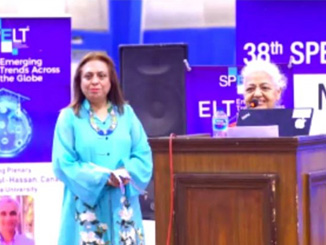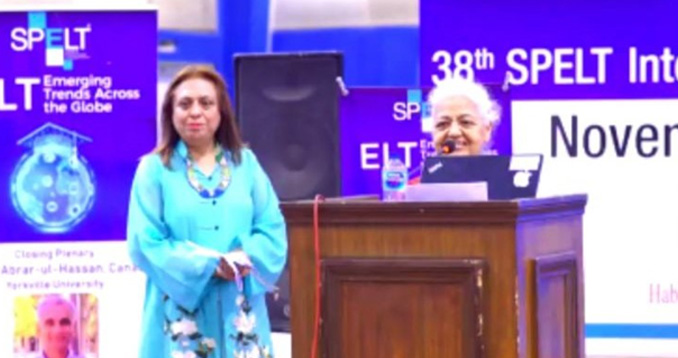

Sapan News 14 November 2022: The best educators are perpetual learners, gaining from their students and their peers. Many from across Asia recently participated in a groundbreaking ‘Teacher Stories’ competition, sharing and learning how their peers face and overcome challenges.
The idea behind this unique initiative was to create “a forum to inspire the professional development of novice teachers,” says eminent teacher trainer Zakia Sarwar, who founded the competition three years ago. She came up with the idea to include the competition as a segment at an annual international teachers’ conference in Pakistan.
The conference is a flagship event of the Society of Pakistan English Language Teachers (Spelt) that Professor Sarwar founded in the 1980s along with a group of dedicated colleagues. The 38th Spelt annual international conference concluded last weekend at Habib Public School, Karachi. This was Spelt’s first hybrid convention, catalysed by the COVID-19 pandemic.
The pandemic in fact forced educators around the globe to become learners trying to find ways to avoid compromising the quality of education.
“The covid-19 pandemic has changed everyone’s life in a big way,” writes Asha Rani Khuranain, in her story, which is set during the first wave in New Delhi, India, when there was widespread fear due to high fatalities.
The story is about a secondary-level English language teacher in New Delhi trying to get her adolescent learners to focus on improving their vocabulary and writing skills with the online platform Microsoft Teams. The activity keeps them engaged through a traumatic time while teaching them adaptability and imparting confidence in their ability to write.
We went through similar struggles in Pakistan, where I led the almost overnight move to online teaching for the English Language Centre at the University of Central Punjab. Our teachers also used the MS Teams platform.
The narrative in Pakistan of India as the enemy and vice versa dissipates when we see ordinary people struggling to overcome the same issues.
A story by Aida A. Liyagon from Ifugao, Philippines, is also about a teacher trying to find ways to deliver quality education to her learners during the pandemic. The two-way radio she came up with to keep communication open with her learners was one of the shortlisted innovations for the Southeast Asian Ministers of Education Organization and Japan Education for Sustainable Development Award 2021.
The 2022 competition received 120 entries from around Pakistan, India, Bangladesh, Nepal, Sri Lanka, Indonesia, Philippines, Saudi Arabia, and Dubai. Competition organisers shortlisted 89 for an international panel of English-language teaching experts to judge.
Ambreena Kazi, a Spelt founder member, at the conference in person in Karachi. Photo: Screenshot from online meeting. I was honoured to be part of the judges’ panel this year along with eminent educationists Jane Willis, known for her work in Task Based Learning and Teaching; Alan Marley with extensive experience of teaching in various countries and editor for Resource Books for Teachers series; Dr. Deborah Healey President of the TESOL International Association 2019-2020 and a known name in both ELT and teacher training; and Aneesa Mumtaz, a Spelt founder member who recently retired as principal of St Patrick’s College of Education in Karachi.
We read all the stories ‘blind’ – that is, without knowing the writers’ identities — then used a rubric to mark them, before meeting to finalise results and share reflections.
Writers of the three winning entries, one from Pakistan and two from India, read their works out online at the Spelt conference to a full auditorium.
The meritorious list included four stories from Pakistan, three from India, two from Nepal and one from the Philippines.
The stories transcended borders. As a language educator, I know that some strategies are universal but reviewing the submissions, I was struck by the similarity of the issues faced and the solutions found. Different approaches taken to resolve classroom issues aim for the same outcome: to help learners improve language skills.
‘No Heedling to a New Seedling’ by Neeraja Vinjamaram from GPS St. Peters Kachiguda, India, features a little girl who’s afraid to speak up in the English class for fear of being ridiculed. The teacher gently encourages her to persevere, appreciating her for every right answer, and stressing the importance of trying.
“It’s okay to make mistakes. We don’t always need to be right.” The child develops into a confident learner who helps other students overcome their fear of making mistakes. This story won third place at the competition.
The second winner was ‘The Worst Teacher’ by Lee Krishnan of Diamond Jubilee High School, Mumbai, in which a teacher refuses to give up on a student despite his resistance and resentment. She leaves no stone unturned to understand the cause of the student’s difficult behaviour, which stemmed from trauma after his father’s death. The narrative ends with the student acknowledging the teacher’s efforts and remaining in touch with her, 20 years later. There is no mention of religion, but we can infer from their names that she is Hindu and the student Muslim. Education, like medicine, is beyond religious divides.
A story from Muzaffargarh, Pakistan featured a similar issue with a student displaying difficult behaviour. Describing the problem, teacher Zil e Huma writes, “He was a good boy, just traumatised by his mother’s death and upset by his stepmother’s treatment of him.”
As she spends time to mentor him, he begins focusing on his studies. His behaviour improves. Meanwhile, her own attitude changes. From thinking of the students as “nothing more than children I had to teach, now I thought of them as nothing less than my own children.”
These teachers on either side of the border faced similar situations, kept their calm, and went the extra mile to successfully mentor their students.
The winning story, ‘A Tale of a Teacher’, by Freeha Sheikh from Lahore Grammar School, shares the journey of an early year educator to teaching O-levels English. She goes from being a happy-go-lucky teacher to a strict one, until a professional development opportunity compels her to reflect on her practice and become mindful of varied learning styles. She realises that being empathetic towards her learners enables them to learn more effectively.
Getting teenage students to regulate and channelise their emotions by articulating thoughts through a writing activity also enables effective learning, writes Urooj Aamir in her story from Sialkot, Pakistan. Students not only honed their skills in multiple journaling sessions but “their interest in English also peaked”.
Professor Laxman Gangwal from Nepal uses similar techniques to learn how to better help his students. In ‘My Journey as a Writing Teacher’, he shares how he tasks his students to work on formative, ungraded essays on any topic. “When I received their submissions, I realised why free writing was necessary – it provides a real diagnosis of writing skills. I got a clear picture of who was at what level and who needed support in what areas.”
This is something I also do to better understand the different needs of my students and offer the required support.
Some stories acknowledged the impact of learner feedback and input on their teaching practice. Saudi Tantong, from Zamboanga, Philippines, shared the feedback of a student who appreciated the advice, understanding, patience and kindness the teacher provided. “Those words stuck in my mind. What they don’t know is that they are the ones who changed me,” he writes in ‘My Students Taught Me’.
In her story, Aaliya Aziz from Pakistan talks about keeping learners engaged and how the tables turned when she learned to “identify the learners’ needs” and provide varied activities to stimulate them according to “their style of learning”.
Bhola Kumar KC from Nepal echoes this in his story. “Motivation plays a vital role in learning,” he writes, sharing how he applies different techniques to motivate his students.
The Teacher Stories competition “empowers teachers and gives them a voice”, comments Lubna Mohyuddin, this year’s competition coordinator and a lead editor at Oxford University Press, Pakistan.
The initiative also helps teachers connect with experienced mentors and provides an opportunity to reach a further audience — the stories are published in the Spelt Quarterly Journal that reaches English-language teachers across the world.
Learning from the experiences of colleagues across borders heightens a realisation of the need to work together. This helps build a resource bank of activities that work in different contexts, benefitting everyone. Sharing such stories connects people at the personal level and shows us that another world is indeed possible.
The writer is an educationist currently based in Bloomington, Indiana, US. She has worked in English-language teaching and teacher training in Australia, Pakistan, Africa, and the USA. Email: humarazaquraishi@gmail.com.
This is a Sapan News syndicated feature available to use with credit to Sapan News Network.

Leave a Reply